Final Report
Harshani's Final Report
Empowering Visionaries: Transforming Disability Inclusion and Access in Sri Lanka
I am Harshani Kaushalya from Sri Lanka. I have low vision, but I firmly believe that I still have useful vision, which drives my desire to help others as much as I can. Two years ago, I graduated from the University of Colombo. Fueled by my conviction and a passion for making a difference, I came to Japan on the 23rd of October to participate in the 23rd Duskin Leadership Training program. This opportunity is not only significant for me personally but also holds great promise for my country. Through this training, I have been able to learn a multitude of valuable skills and insights that I am eager to share and implement back home.
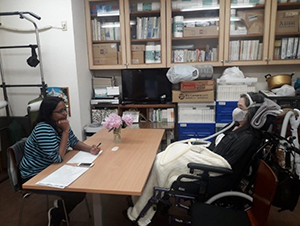
During the program, I attended a three-month Japanese language class, which laid a crucial foundation for my journey. Understanding the Japanese language is important to me because I aspire to establish a foundation that distributes Japanese Braille language among school students with vision impairments in Sri Lanka. These students are eager to learn Japanese, but the lack of interpreters to translate Japanese Braille into Japanese has been a barrier, preventing them from studying Japanese as a subject.
As a Duskin trainee, I had the opportunity to enhance my Japanese language skills and learn Braille. These skills were instrumental in my success during the individual training sessions. My improved proficiency in Japanese enabled me to communicate effectively and engage deeply with the training material. Learning Braille was particularly empowering, as it opened up new avenues for accessing information and resources.
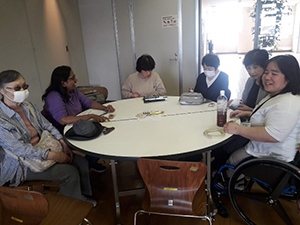
During the Duskin training program, I and other trainees also received training in wheelchair assistance and assisting the visually impaired. This training was crucial in helping us support each other during the sessions, fostering a collaborative and inclusive environment. By learning proper techniques and gaining hands-on experience, we were able to navigate more effectively and assist fellow trainees, enhancing the overall training experience for everyone involved. This training helped us recognize that what one person might struggle with alone, we could achieve together through mutual support and cooperation.
The Duskin training program, particularly in Group Training Part 1 and 2, significantly enhanced my development as a trainee and leader. It improved my leadership skills, teaching me effective communication, motivation, and guidance techniques essential for creating an inclusive environment. The program raised my awareness about disability issues and taught me how to promote inclusive practices, fostering a more supportive and accessible community. Training activities boosted my self-confidence and personal growth, while self-reflection emphasized the importance of evaluating progress and celebrating achievements.
I developed a clear vision for the future, setting goals and actionable plans for sustained progress. Learning about disability policies in other developing countries, including Japan, broadened my perspective and provided valuable advocacy lessons. These experiences empowered me to lead and inspire others effectively.
In addition to leadership training, the program enhanced my project proposal writing skills, enabling me to craft compelling proposals, articulate goals clearly, and plan budgets effectively. This allows me to secure funding for initiatives aimed at improving services for individuals with disabilities in Sri Lanka.
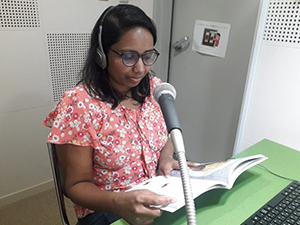
My presentation skills improved, helping me advocate for disabled individuals by presenting compelling cases to stakeholders and the community.
Networking skills enabled me to build professional relationships, leverage networks for collaboration, and connect with experts and organizations for support. These experiences and skills have shaped me into a more effective leader for Sri Lanka, equipped to advocate for disability inclusion, design impactful projects, and foster a more inclusive society.
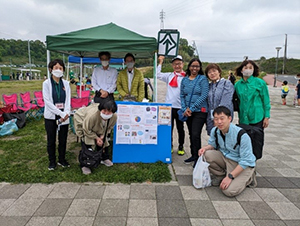
Individual training sessions were instrumental in preparing me to become an instructor for university students with disabilities, a role that will significantly benefit Sri Lanka. By visiting universities in Osaka and Kyoto, such as Kyoto University, Ritsumeikan University, Bukkyo University, Kyoto University of Foreign Studies, and Doshisha University, I observed support systems and services for students with disabilities. These experiences highlighted the importance of creating inclusive environments and inspired me to implement similar practices in Sri Lankan universities, ultimately improving educational outcomes for students with disabilities.
Visits to specialized institutions like the Japan Braille Library, Kyoto Lighthouse, Osaka Lighthouse, Human Care Center, and Kyoto Center for Hearing Impaired provided insights into creating accessible workplaces and offering valuable resources for individuals with various disabilities. This knowledge is crucial for developing comprehensive support systems in Sri Lanka that address the needs of people with visual, hearing, and physical impairments.
Learning about DAISY accessible book production equipped me with the skills to produce alternative formats of textbooks and readings, ensuring all students have equal access to course materials. This capability will significantly enhance the learning experience for students with print disabilities in Sri Lanka, promoting independent learning and self-reliance.
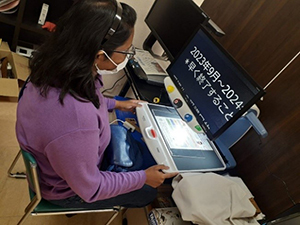
Completing a peer counseling course at the Human Care Center in Hachioji further enhanced my ability to provide emotional and practical support to students with disabilities, fostering a supportive learning environment. In conclusion, my journey through the Duskin Leadership Training program has been nothing short of transformative. Equipped with enhanced leadership skills and a deepened understanding of disability inclusion,
During my time in Japan as part of the Duskin Leadership Training program, I had the invaluable opportunity to explore two significant areas of focus: para sports and accessible environments for people with disabilities. Para sports not only promote inclusivity by highlighting the abilities of athletes with disabilities but also play a crucial role in raising awareness and reducing stigma surrounding disability. By encouraging participation in physical activities, para sports contribute to improved health and well-being among individuals with disabilities while fostering a sense of community among athletes, families, and supporters. Moreover, these sports open doors to enhanced opportunities, including increased funding, development, and participation in international competitions.
Additionally, my visits to various accessible places and companies in Japan underscored the importance of creating inclusive environments. These experiences have equipped me with insights and strategies that are crucial for promoting accessible tourism in Sri Lanka, ensuring that individuals with disabilities can fully participate in and enjoy the country's attractions. Together, these endeavours aim to create a more inclusive society where all individuals, regardless of ability, can thrive and contribute meaningfully.
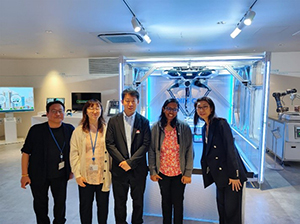
Conclusion
I am eager to share the benefits of Japanese language learning with Sri Lanka’s vision-impaired community. My goal is to establish a foundation that promotes Japanese language and Braille education, leveraging my newfound expertise to create tangible, positive change. The program has not only broadened my perspective on disability policies and inclusive practices but has also equipped me with practical skills in accessible book production and peer counselling. Armed with these capabilities, I am committed to fostering an environment of mutual assistance and empowerment back home.
By advocating for disability rights and promoting educational inclusivity, I aim to forge a more accessible and supportive environment for all individuals in Sri Lanka. My experiences with the Duskin program have laid a solid foundation for this endeavour, empowering me to lead initiatives that will have a lasting impact on my community and beyond.




